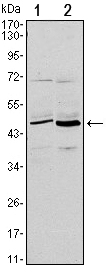CD86 Monoclonal Antibody
- Catalog No.:YM0137
- Applications:WB;ELISA
- Reactivity:Human
- Target:
- CD86
- Fields:
- >>Cell adhesion molecules;>>Toll-like receptor signaling pathway;>>Intestinal immune network for IgA production;>>Type I diabetes mellitus;>>Kaposi sarcoma-associated herpesvirus infection;>>Transcriptional misregulation in cancer;>>Autoimmune thyroid disease;>>Systemic lupus erythematosus;>>Rheumatoid arthritis;>>Allograft rejection;>>Graft-versus-host disease;>>Viral myocarditis
- Gene Name:
- CD86
- Protein Name:
- T-lymphocyte activation antigen CD86
- Human Gene Id:
- 942
- Human Swiss Prot No:
- P42081
- Mouse Swiss Prot No:
- P42082
- Immunogen:
- Purified recombinant fragment of human CD86 expressed in E. Coli.
- Specificity:
- CD86 Monoclonal Antibody detects endogenous levels of CD86 protein.
- Formulation:
- Liquid in PBS containing 50% glycerol, 0.5% BSA and 0.02% sodium azide.
- Source:
- Monoclonal, Mouse
- Dilution:
- WB 1:500 - 1:2000. ELISA: 1:10000. Not yet tested in other applications.
- Purification:
- Affinity purification
- Storage Stability:
- -15°C to -25°C/1 year(Do not lower than -25°C)
- Other Name:
- CD86;CD28LG2;T-lymphocyte activation antigen CD86;Activation B7-2 antigen;B70;BU63;CTLA-4 counter-receptor B7.2;FUN-1;CD antigen CD86
- Molecular Weight(Da):
- 60-80kD
- References:
- 1. Clin Exp Allergy. 2009 Dec;39(12):1852-6.
2. Am J Hum Genet. 2009 Nov;85(5):628-42.
3. Immunology. 2009 Nov;128(3):334-41
- Background:
- This gene encodes a type I membrane protein that is a member of the immunoglobulin superfamily. This protein is expressed by antigen-presenting cells, and it is the ligand for two proteins at the cell surface of T cells, CD28 antigen and cytotoxic T-lymphocyte-associated protein 4. Binding of this protein with CD28 antigen is a costimulatory signal for activation of the T-cell. Binding of this protein with cytotoxic T-lymphocyte-associated protein 4 negatively regulates T-cell activation and diminishes the immune response. Alternative splicing results in several transcript variants encoding different isoforms.[provided by RefSeq, May 2011],
- Function:
- function:Receptor involved in the costimulatory signal essential for T-lymphocyte proliferation and interleukin-2 production, by binding CD28 or CTLA-4. May play a critical role in the early events of T-cell activation and costimulation of naive T-cells, such as deciding between immunity and anergy that is made by T-cells within 24 hours after activation. Isoform 2 interferes with the formation of CD86 clusters, and thus acts as a negative regulator of T-cell activation.,online information:CD86 entry,PTM:Polyubiquitinated; which is promoted by MARCH8 and results in endocytosis and lysosomal degradation.,similarity:Contains 1 Ig-like C2-type (immunoglobulin-like) domain.,similarity:Contains 1 Ig-like V-type (immunoglobulin-like) domain.,subunit:Interacts with MARCH8. Interacts with human herpesvirus 8 MIR2 protein (Probable). Interacts with adenovirus subgroup B fiber proteins and acts as
- Subcellular Location:
- Cell membrane; Single-pass type I membrane protein.
- Expression:
- Expressed by activated B-lymphocytes and monocytes.
Ciprofloxacin promotes polarization of CD86+CD206‑ macrophages to suppress liver cancer. ONCOLOGY REPORTS Oncol Rep. 2020 Jul;44(1):91-102 WB Human 1:1000 HepG2 cell
Fan, Mengtian, et al. "Ciprofloxacin promotes polarization of CD86+ CD206‑macrophages to suppress liver cancer." Oncology reports 44.1 (2020): 91-102.
- June 19-2018
- WESTERN IMMUNOBLOTTING PROTOCOL
- June 19-2018
- IMMUNOHISTOCHEMISTRY-PARAFFIN PROTOCOL
- June 19-2018
- IMMUNOFLUORESCENCE PROTOCOL
- September 08-2020
- FLOW-CYTOMEYRT-PROTOCOL
- May 20-2022
- Cell-Based ELISA│解您多样本WB检测之困扰
- July 13-2018
- CELL-BASED-ELISA-PROTOCOL-FOR-ACETYL-PROTEIN
- July 13-2018
- CELL-BASED-ELISA-PROTOCOL-FOR-PHOSPHO-PROTEIN
- July 13-2018
- Antibody-FAQs
- Products Images

- Western Blot analysis using CD86 Monoclonal Antibody against L1210 (1) and MOLT-4 (2) cell lysate.



